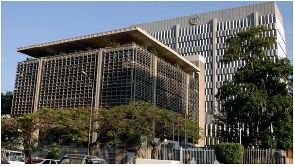 Bank of Uganda has been actively managing volatility from foreign capital flows.
Bank of Uganda has been actively managing volatility from foreign capital flows.
Uganda is running an economy with the most developed financial sector in the region, according to the latest study by the Official Monetary and Financial Institutions Forum (OMFIF) and Absa Bank. The latest feat depicts a major milestone in the country’s race towards becoming a regional financial hub, with an eye to increased inflow of foreign direct investments. The sixth edition of the Absa Africa Financial Markets Index (2022) report shows that Uganda has made significant improvement in five key areas compared to Kenya, Tanzania, Rwanda and DR Congo. These include access to the foreign exchange market, transparency in taxation and regulatory regime, the capacity of local investors, the state of the macroeconomic environment, and transparency in the enforcement of legal contracts. According to the report that was released last week, Uganda beat its regional peers on market accessibility, openness, and transparency. It is followed by Kenya, Tanzania, Rwanda, and the DRC. The report dubbed Harnessing the Power of African Opportunity shows that Uganda has improved in opening its market to foreign investments. The country has eased the severity of capital controls, bolstered interbank foreign exchange liquidity, and enhanced reporting standards of exchange rate data. This is in addition to the Bank of Uganda (BoU)’s ability to manage volatility from foreign capital flows by considering the adequacy of forex reserves. Uganda’s interbank foreign exchange liquidity rose significantly, with annual turnover rising to $28.4 billion this year from $21.5 billion in 2021. Tanzania progress Tanzania has also moved to liberalize its capital account through its Foreign Exchange Regulation Act 2022 that opened up access to foreign investors in the domestic debt market. This included allowing investors from Southern African Development Community (Sadc) member states to participate in the government bonds market at the primary market level. The new regulations also give domestic residents easier access to regional financial markets to diversify their investment portfolios. According to the Absa report, Uganda has also made a strong improvement on the environmental, social, and governance (ESG) indicators. This is after BoU launched a strategic plan for 2022-27 that includes new goals such as the promotion of a sustainable financial system. Central Bank of Kenya also issued guidance for banks to incorporate climate-related factors into their risk management frameworks. The Absa Africa Financial Markets Index is used as a benchmark by the investment community to gauge African countries’ market infrastructure and to help policymakers learn from others. The study covered 26 countries with the addition of the DRC, Madagascar, and Zimbabwe. South Africa had the most developed financial sector in the continent while Ethiopia, which is still moving towards a securities exchange and more robust legal framework, ranked the least.
Uganda is running an economy with the most developed financial sector in the region, according to the latest study by the Official Monetary and Financial Institutions Forum (OMFIF) and Absa Bank. The latest feat depicts a major milestone in the country’s race towards becoming a regional financial hub, with an eye to increased inflow of foreign direct investments. The sixth edition of the Absa Africa Financial Markets Index (2022) report shows that Uganda has made significant improvement in five key areas compared to Kenya, Tanzania, Rwanda and DR Congo. These include access to the foreign exchange market, transparency in taxation and regulatory regime, the capacity of local investors, the state of the macroeconomic environment, and transparency in the enforcement of legal contracts. According to the report that was released last week, Uganda beat its regional peers on market accessibility, openness, and transparency. It is followed by Kenya, Tanzania, Rwanda, and the DRC. The report dubbed Harnessing the Power of African Opportunity shows that Uganda has improved in opening its market to foreign investments. The country has eased the severity of capital controls, bolstered interbank foreign exchange liquidity, and enhanced reporting standards of exchange rate data. This is in addition to the Bank of Uganda (BoU)’s ability to manage volatility from foreign capital flows by considering the adequacy of forex reserves. Uganda’s interbank foreign exchange liquidity rose significantly, with annual turnover rising to $28.4 billion this year from $21.5 billion in 2021. Tanzania progress Tanzania has also moved to liberalize its capital account through its Foreign Exchange Regulation Act 2022 that opened up access to foreign investors in the domestic debt market. This included allowing investors from Southern African Development Community (Sadc) member states to participate in the government bonds market at the primary market level. The new regulations also give domestic residents easier access to regional financial markets to diversify their investment portfolios. According to the Absa report, Uganda has also made a strong improvement on the environmental, social, and governance (ESG) indicators. This is after BoU launched a strategic plan for 2022-27 that includes new goals such as the promotion of a sustainable financial system. Central Bank of Kenya also issued guidance for banks to incorporate climate-related factors into their risk management frameworks. The Absa Africa Financial Markets Index is used as a benchmark by the investment community to gauge African countries’ market infrastructure and to help policymakers learn from others. The study covered 26 countries with the addition of the DRC, Madagascar, and Zimbabwe. South Africa had the most developed financial sector in the continent while Ethiopia, which is still moving towards a securities exchange and more robust legal framework, ranked the least.